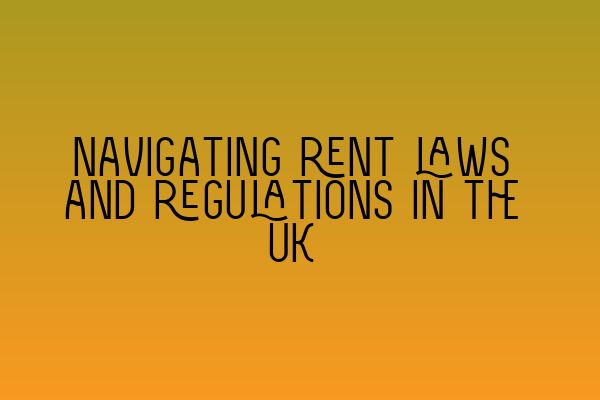Navigating Rent Laws and Regulations in the UK
Renting a property in the UK can be a complex process, with numerous laws and regulations in place to protect both landlords and tenants. As a solicitor specializing in property law at SQE Property Law & Land Law, I understand the challenges that individuals and businesses face when dealing with rental properties. In this blog post, we will explore some key aspects of rent laws in the UK and provide guidance on how to navigate them effectively.
1. Understanding Tenancy Agreements
The first step in renting a property is signing a tenancy agreement, which outlines the terms and conditions of the rental. It is crucial to carefully read and understand this document before signing it. The tenancy agreement should include details such as the rental amount, payment frequency, duration of the tenancy, and responsibilities of both the landlord and tenant. If you have any concerns or require clarifications, it is advisable to seek legal advice before signing the agreement.
For a comprehensive understanding of tenancy agreements, you can review our related article on SQE Property Law & Land Law on SQE 1 Practice Exam Questions.
2. Rental Deposits and Rent Payments
When entering into a tenancy agreement, landlords commonly require tenants to pay a rental deposit. The deposit serves as security against any damages to the property or unpaid rent at the end of the tenancy. In the UK, landlords are legally obliged to protect tenants’ deposits using a government-approved tenancy deposit protection (TDP) scheme. Tenants should ensure that their deposit is protected by such a scheme and that they receive the prescribed information relating to the deposit within 30 days.
Moreover, tenants must understand their rights and responsibilities concerning rent payments. It is essential to maintain a record of all rent payments and ensure they are made on time. In case of any disputes regarding rent payments or deposit deductions, it is advisable to seek legal advice promptly.
For more information on rental deposits and rent payments, our related article on SQE Property Law & Land Law on SQE 1 Practice Mocks FLK1 FLK2 can provide valuable insights.
3. Repairs and Maintenance
Landlords have a legal obligation to maintain the rental property in a safe and habitable condition. This includes ensuring that essential utilities, such as heating and hot water, are in proper working order. If repairs are needed, tenants should promptly notify their landlord or letting agent in writing.
In case landlords fail to carry out necessary repairs, tenants may have the right to take legal action or report the issue to the local council’s environmental health department. It is crucial for tenants to understand their rights and the appropriate procedures to follow in such situations.
If you require further guidance on repairs and maintenance, our related article on SQE Property Law & Land Law on SQE 2 Preparation Courses can offer valuable information.
4. Evictions and Termination of Tenancy
Understanding the eviction process and termination of tenancy is crucial for both landlords and tenants. There are various grounds under which a landlord can seek possession of the property, including non-payment of rent, breach of tenancy agreement, or the landlord’s intention to sell the property.
Similarly, tenants must follow the correct procedures when giving notice to terminate their tenancy. Failure to do so may result in financial penalties or difficulties in obtaining future rental references.
To stay informed about the eviction process and termination of tenancy, we encourage you to read our related article on SQE Property Law & Land Law on SQE 1 and SQE 2 Preparation Courses.
Conclusion
Renting a property in the UK can be a complex process, given the multitude of rental laws and regulations in place. It is vital for both landlords and tenants to understand their rights and responsibilities to ensure a smooth and mutually beneficial tenancy. Seeking professional legal advice and guidance from experts in property law can provide invaluable assistance throughout the rental process.
At SQE Property Law & Land Law, we specialize in providing comprehensive legal services related to rent laws in the UK. Our team of experienced solicitors is dedicated to helping individuals and businesses navigate the complexities of property law.
If you require further assistance or legal advice regarding rent laws and regulations, please do not hesitate to contact us at SQE Property Law & Land Law.
